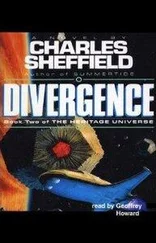“Me.” Judd Clemens had his hand already in the air. “I want to go. I know how to travel easily over snow, I’ve done it often enough.”
“And me.” Big Eddie Hansen raised his hand.
Barringer stared at him. “Do you know how to move on snow?”
“Better than you do. And like you said, I’d go crazy sitting here waiting for nothing.”
“He’ll be fine,” Clemens added. “Me and Eddie know the land and we work together good. All right?”
“Just give me a minute.” Barringer had been thinking of two trips, one man to BSP and one to Amarillo. But what Judd Clemens said made a lot more sense. If BSP was affected, so almost certainly was Amarillo. And two men could help each other if one got into difficulties. “All right.”
“When can we go?” Clemens asked.
Barringer glanced out of the thick plastic window. It was still a few days short of the equinox, so at this latitude the sun never rose above the horizon. From about ten to two in the afternoon, a strange half-light reflected off the clouds. Today it was calm outside, with no breath of wind. “It looks good to me right now. What do you think?”
“Perfect.” Clemens stood up. “Come on, Eddie. Let’s get suited up and our snowshoes on, and we’ll be off.”
“Where’ll we go, Judd?”
“Amarillo. They eat better than at BSP. With luck we’ll be there in time for dinner.”
In five minutes they were pushing out through the multiple layers of thermal plastic that covered the flimsy door of the hut. In one more minute, Judd Clemens was back.
“Here.” He handed the rifle that he was carrying to Dahlquist. “I thought I’d better test it to make sure this fired, before we lugged it all the way to Amarillo. You can add it to the list of things that doesn’t work. See you tomorrow, early afternoon.”
He pushed his way out again, while Dahlquist sat down and examined the weapon.
“Odd. I would have thought that this — oh, I think I see. It’s the laser range finder and the target follower, they are controlled by a little ballistic computer. When that’s out of use, there’s a safety feature that stops the gun from being fired.”
“Could it be bypassed?”
“I think so. With a bit of tinkering.” Dahlquist laid the rifle down. “I’ll take a look at it later. At the moment I have three weeks’ worth of well logs to look at — and no computer to help.”
Barringer took the hint. He put on his own suit and went outside. The area around the camp was flat and featureless. Bathurst Island was a bare, eroded, and glaciated sheet of rock, with nothing but the small island of Ellef Ringnes between its jagged shoreline and the North Pole. A big change from Indonesia, or the tall offshore rigs east of the Falklands.
The snow around the prefab hut was about a foot and a half deep. Its thin crust showed the marks of two pairs of snowshoes, heading off to the southwest. Judd Clemens and Big Eddie Hansen were already reduced to two blurry dots on the horizon. They had moved much faster across the snow than Barringer could ever have done.
He turned to go back inside. Clemens, and Big Eddie, too, might be at home in this land, but they were not real oilmen. Oilmen roamed the world. They would never stay a life in one place.
A full day passed with no sign of Judd Clemens and Eddie Hansen. Barringer was not worried. The weather held fine, and visibility was good.
On the second day, about noon, he went outside again. He wanted to look for the others, and also Dahlquist was getting on his nerves. The geologist was prone to confusing a discussion of neutron well logs with conversation.
The weather was changing, but not in any threatening way. The temperature was up, and a thin fog lay on the land. It was not enough to confound, and anyway Judd Clemens was a seasoned Arctic traveler with a good sense of direction. But where the devil were they? They must know that he was itching to know the situation at the Amarillo camp.
About ten o’clock on the third morning, Dahlquist suited up to take the short walk over to the rig. “Be back in about an hour,” he said.
Barringer nodded. Yesterday’s feeling of irritation with Dahlquist was still there.
By one-thirty the geologist had not returned and there was still no sign of Clemens and Hansen. Barringer put on his own snowsuit, feeling more annoyance than alarm. He had fried ham steaks over the oil stove for him and Dahlquist, and eaten some himself. The rest was cold and spoiled, and he was damned if he would start over when the other man came back.
The air outside was warmer and perfectly still. Yesterday’s fog had thickened. The dark oil rig, about fifty yards from the hut, stood misted and indistinct.
Barringer walked in that direction, crunching through frozen snow and calling Dahlquist’s name. His voice was swallowed up by the still air. He came to the drill site and circled around it. On the far side, about five paces beyond the rig, he saw a ragged piece of windproof cloth. It was bloodstained. Two steps away he noticed a long smear of blood leading away from the rig. The surrounding surface of the snow was trampled and broken.
Barringer did not follow the line of the long blood smear. He backed away toward the hut, nerves jangling. When he turned he saw what he ought to have noticed earlier: paw prints in the snow, ten inches across. They led toward, and wandered around, the hut.
He ran for the door with its hanging sheets of thick plastic. As he opened it and went through, he turned. A white shadow was approaching through the fog, silently and at great speed. He scarcely had time to close the door and snap the bolt into position.
The building shook. Barringer backed away across the hut and snuffed the oil lamp. In the darkness, he waited. Ten seconds later a tall form reared up against the window. He saw great curved claws on the window’s edge, and a long head reaching for the roof. At last the beast dropped to all fours. The nose quested, sampling the air for a few moments, then the animal turned and loped away across the snow. Barringer thought that he made out two more shapes, outlined eerily against the swirling mist.
He had seen polar bears before, from a distance. Judd Clemens had pointed them out. He said, “You have to pity them. For twenty thousand years they ruled this land. Everything they saw was either their own species or it was prey. Then we came along and took over.”
Took over with our helicopters that could seek them out, our power sleds that could outrun them, and our guns that could kill from half a mile away. But without those aids, Nature’s balance tilted back the other way. No need now to pity the bears.
In the dark hut, Barringer groped his way to where Dahlquist had sat. A full-sized polar bear weighed half a ton. It was ten feet from nose to hindquarters, and it could run faster than any human. The wicked claws would rip the walls of the hut like tissue paper.
Had Dahlquist found time to do his “bit of tinkering,” enough to make the rifle work? Barringer was about to find out. Then, and only then, would he have an idea of his own possible future.
March 21, 2026.
Art Ferrand woke just before dawn. The only bedroom of the house faced due east, and he lay at ease until he could watch the disk of the rising sun neatly divided by an east-west line of fence running down the middle of the yard.
Day 41, and the vernal equinox. In a normal year, at this latitude and altitude, the crocuses would be about ready to flower.
But this was not a normal year. Yesterday, the tulips and azaleas had been in bloom in the front yard.
Art rolled over and climbed carefully out of bed. Gingerly, he put weight on his right leg. Some aches and pains were easing, but some would be with him forever. At sixty-two, lost cartilage did not replace itself even with the telomod treatment. His knee was probably as good as it would ever be, and that wasn’t so great.
Читать дальше












